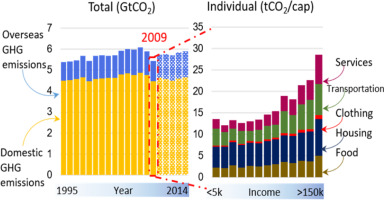This is an interesting breakdown of greenhouse gas emissions based on our households. The data illustrates how our lifestyles and consumer society add to atmospheric CO2. When taken as a whole, the numbers are astounding.
"Household consumption – food, housing, transportation, apparel and other personal services – is an important contributor to greenhouse gas emissions. Everything you eat or wear, or every time you drive, you add to the global total emissions. The typical American’s annual per capita carbon footprint is over five times the world per capita average."

 theconversation.com
theconversation.com
"Household consumption – food, housing, transportation, apparel and other personal services – is an important contributor to greenhouse gas emissions. Everything you eat or wear, or every time you drive, you add to the global total emissions. The typical American’s annual per capita carbon footprint is over five times the world per capita average."

5 charts show how your household drives up global greenhouse gas emissions
The typical American’s annual household carbon footprint is over five times the world per capita average.
 theconversation.com
theconversation.com


